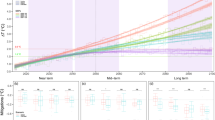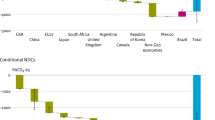Abstract
Individual countries are requested to submit nationally determined contributions (NDCs) to alleviate global warming in the Paris Agreement. However, the global climate effects and regional contributions are not explicitly considered in the countries’ decision-making process. In this study, we evaluate the global temperature slowdown of the NDC scenario (ΔT = 0.6°C) and attribute the global temperature slowdown to certain regions of the world with a compact earth system model. Considering reductions in CO2, CH4, N2O, BC, and SO2, the R5OECD (the Organization for Economic Co-operation and Development in 1990) and R5ASIA (Asian countries) are the top two contributors to global warming mitigation, accounting for 39.3% and 36.8%, respectively. R5LAM (Latin America and the Caribbean) and R5MAF (the Middle East and Africa) followed behind, with contributions of 11.5% and 8.9%, respectively. The remaining 3.5% is attributed to R5REF (the Reforming Economies). Carbon Dioxide emission reduction is the decisive factor of regional contributions, but not the only one. Other greenhouse gases are also important, especially for R5MAF. The contribution of short-lived aerosols is small but significant, notably SO2 reduction in R5ASIA. We argue that additional species beyond CO2 need to be considered, including short-lived pollutants, when planning a route to mitigate climate change. It needs to be emphasized that there is still a gap to achieve the Paris Agreement 2-degree target with current NDC efforts, let alone the ambitious 1.5-degree target. All countries need to pursue stricter reduction policies for a more sustainable world.
摘要
:《巴黎协定》规定了各个国家应提交国家自主贡献以缓解全球变暖。然而,各国在制定国家自主贡献时,并未明确考虑全球气候影响和区域减排贡献,因此有必要评估各国的国家自主贡献对减缓气候变化的贡献。本文首先模拟了自出减排情景下相对于无政策情景升温减缓了0.6℃,并通过简化地球系统模型将全球升温减缓归因于全球不同区域的减排行动。在考虑二氧化碳、甲烷、氧化亚氮、黑碳和二氧化硫五种气候强迫物质的减排情况下,经合组织成员国和亚洲国家是减缓全球变暖的两大贡献者,分别贡献了39.3% 和36.8%。拉美国家、中东非国家和转型经济体国家分别贡献了剩下的11.5%、8.9%和3.5%。二氧化碳的减排是区域贡献的决定性因素,但不是唯一因素。其他温室气体也很重要,尤其是对于中东非国家。气溶胶的贡献很小但是显著,特别是亚洲国家中的对二氧化硫的减排。我们认为,在规划减缓气候变化的路线时,需要考虑二氧化碳以外的其他物质,包括短期污染物。需要强调的是,目前的减排政策距离实现《巴黎协定》2℃目标仍有差距,更不必说雄心勃勃的1.5℃目标了。所有国家都需要采取更严格的减排政策,以实现世界的更可持续发展。
Similar content being viewed by others
References
Ciais, P., and Coauthors, 2013: Attributing the increase in atmospheric CO2 to emitters and absorbers. Nature Climate Change, 3(10), 926–930, https://doi.org/10.1038/nclimate1942.
Climate Watch, 2020. Washington, DC: World Resources Institute. Available from https://www.climatewatchdata.org.
Denison, S., P. M. Forster, and C. J. Smith, 2019: Guidance on emissions metrics for nationally determined contributions under the Paris Agreement. Environmental Research Letters, 14(12), 124002, https://doi.org/10.1088/1748-9326/ab4df4.
Fu, B., and Coauthors, 2020: Short-lived climate forcers have long-term climate impacts via the carbon-climate feedback. Nature Climate Change, 10(9), 851–855, https://doi.org/10.1038/s41558-020-0841-x.
Fu, B., and Coauthors, 2021: The contributions of individual countries and regions to the global radiative forcing. Proceedings of the National Academy of Sciences of the United States of America, 118(15), e2018211118, https://doi.org/10.1073/PNAS.2018211118.
Gasser, T., L. Crepin, Y. Quilcaille, R. A. Houghton, P. Ciais, and M. Obersteiner, 2020: Historical CO2 emissions from land use and land cover change and their uncertainty. Biogeosciences, 17(15), 4075–4101, https://doi.org/10.5194/bg-17-4075-2020.
Gasser, T., P. Ciais, O. Boucher, Y. Quilcaille, M. Tortora, L. Bopp, and D. Hauglustaine, 2017: The compact Earth system model OSCAR v2.2: Description and first results. Geoscientific Model Development, 10(1), 271–319, https://doi.org/10.5194/gmd-10-271-2017.
Gasser, T., and Coauthors, 2018: Path-dependent reductions in CO2 emission budgets caused by permafrost carbon release. Nature Geoscience, 11(11), 830–835, https://doi.org/10.1038/s41561-018-0227-0.
Huppmann, D., J. Rogelj, E. Kriegler, V. Krey, and K. Riahi, 2018: A new scenario resource for integrated 1.5°C research. Nature Climate Change, 1(12), 1027–1030, https://doi.org/10.1038/s41558-018-0317-4.
IPCC, 2021: Summary for policymakers. Climate Change 2021: The Physical Science Basis. Contribution of Working Group I to the Sixth Assessment Report of the Intergovernmental Panel on Climate Change, V. Masson-Delmotte et al., Eds., Cambridge University Press.
Leduc, M., H. D. Matthews, and R. de Elía, 2016: Regional estimates of the transient climate response to cumulative CO2 emissions. Nature Climate Change, 6(5), 474–478, https://doi.org/10.1038/nclimate2913.
Li, B. G., and Coauthors, 2016: The contribution of China’s emissions to global climate forcing. Nature, 531(7594), 357–361, https://doi.org/10.1038/nature17165.
Lund, M. T., B. Aamaas, C. W. Stjern, Z. Klimont, T. K. Berntsen, and B. H. Samset, 2020: A continued role of shortlived climate forcers under the Shared Socioeconomic Pathways. Earth System Dynamics, 11 (4), 977–993, https://doi.org/10.5194/esd-11-977-2020.
Matthews, H. D., N. P. Gillett, P. A. Stott, and K. Zickfeld, 2009: The proportionality of global warming to cumulative carbon emissions. Nature, 459(7248), 829–832, https://doi.org/10.1038/nature08047.
Riahi, K., and Coauthors, 2017: The Shared Socioeconomic Pathways and their energy, land use, and greenhouse gas emissions implications: An overview. Global Environmental Change, 42, 153–168, https://doi.org/10.1016/j.gloenvcha.2016.05.009.
Riahi, K., and Coauthors, 2021: Cost and attainability of meeting stringent climate targets without overshoot. Nature Climate Change, 11(12), 1063–1069, https://doi.org/10.1038/s41558-021-01215-2.
Roelfsema, M., and Coauthors, 2020: Taking stock of national climate policies to evaluate implementation of the Paris Agreement. Nature Communications, 11(1), 2096, https://doi.org/10.1038/s41467-020-15414-6.
Rogelj, J., O. Fricko, M. Meinshausen, V. Krey, J. J. J. Zilliacus, and K. Riahi, 2017: Understanding the origin of Paris Agreement emission uncertainties. Nature Communications, 8, 15748, https://doi.org/10.1038/ncomms15748.
Schleussner, C.-F., and Coauthors, 2016: Science and policy characteristics of the Paris Agreement temperature goal. Nature Climate Change, 6(9), 827–835, https://doi.org/10.1038/nclimate3096.
Skeie, R. B., G. P. Peters, J. Fuglestvedt, and R. Andrew, 2021: A future perspective of historical contributions to climate change. Climatic Change, 164(1), 24, https://doi.org/10.1007/s10584-021-02982-9.
Sörgel, B., and Coauthors, 2021: A sustainable development pathway for climate action within the UN 2030 Agenda. Nature Climate Change, 11 (8), 656–664, https://doi.org/10.1038/s41558-021-01098-3.
Trudinger, C., and I. Enting, 2005: Comparison of formalisms for attributing responsibility for climate change: Non-linearities in the Brazilian Proposal approach. Climatic Change, 68(1–2), 67–99, https://doi.org/10.1007/s10584-005-6012-2.
UNFCCC, 2002: Methodological Issues: Scientific and Methodological Assessment of Contributions to Climate Change, Report of the Expert Meeting. Available from https://unfccc.int/resource/docs/2002/sbsta/inf14.pdf.
UNFCCC, 2015: Paris Agreement. Available from https://unfccc.int/sites/default/files/english_paris_agreement.pdf.
UNFCCC, 2021: Nationally determined contributions under the Paris Agreement. Available from https://unfccc.int/sites/default/files/resource/cma2021_08_adv_1.pdf.
van Soest, H. L., M. G. J. den Elzen, and D. P. van Vuuren, 2021: Net-zero emission targets for major emitting countries consistent with the Paris Agreement. Nature Communications, 12(1), 2140, https://doi.org/10.1038/s41467-021-22294-x.
Acknowledgements
This study was funded by the undergraduate student research training program of the Ministry of Education, the National Natural Science Foundation of China (Grants Nos. 41771495, 41830641, and 41988101), and the Second Tibetan Plateau Scientific Expedition and Research Program Grant 2019QZKK0208. The development of OSCAR v3.1 is funded by the European Research Council Synergy project “Imbalance-P” (Grant No. ERC-2013-SyG-610028) and the European Union’s Horizon 2020 research and innovation project “CONSTRAIN” (Grant No. 820829).
Author information
Authors and Affiliations
Contributions
Author Contributions Bengang LI designed the study and lead writing. Bo FU and Jingyi LI equally contributed to this study, who prepared the model set-up, conducted the simulations and wrote the text. Thomas GASSER, Philippe CIAIS, Shilong PIAO and Shu TAO contributed to the interpretation of the results and to the text. Guofeng SHEN, Yuqin LAI and Luchao HAN contributed to the figures and the text.
Corresponding author
Additional information
Article Highlights
• Compared with a no climate policy scenario, the NDC scenario shows a slowed global warming of 0.6°C by the end of the century, although there is still a gap when considering the Paris Agreement target.
• R5OECD and R5ASIA are the top two contributors to global warming mitigation, accounting for 39.3% and 36.8% on average, respectively.
• CO2 reduction is the decisive factor of regional contributions to climate mitigation, while non-CO2 reductions are small but significant.
This paper is a contribution to the special issue on Carbon Neutrality: Important Roles of Renewable Energies, Carbon Sinks, NETs and non-CO2 GHGs.
Rights and permissions
About this article
Cite this article
Fu, B., Li, J., Gasser, T. et al. Climate Warming Mitigation from Nationally Determined Contributions. Adv. Atmos. Sci. 39, 1217–1228 (2022). https://doi.org/10.1007/s00376-022-1396-8
Received:
Revised:
Accepted:
Published:
Issue Date:
DOI: https://doi.org/10.1007/s00376-022-1396-8
Key words
- climate mitigation
- nationally determined contributions
- attribution
- regional contribution
- integrated assessment models




